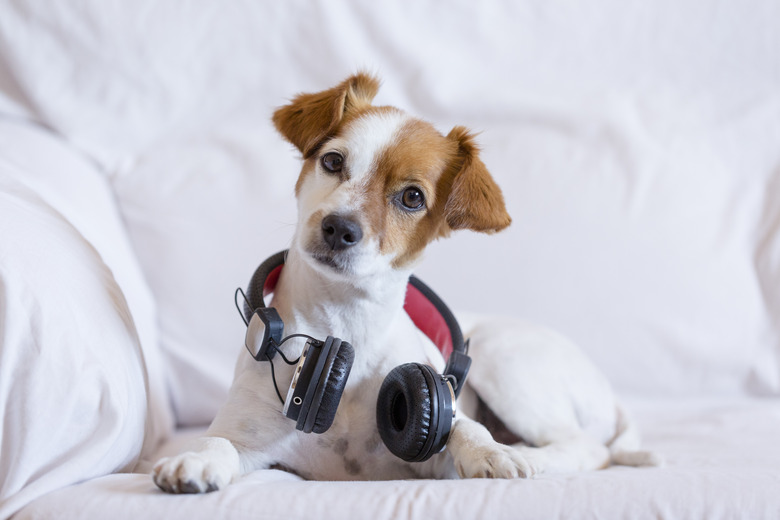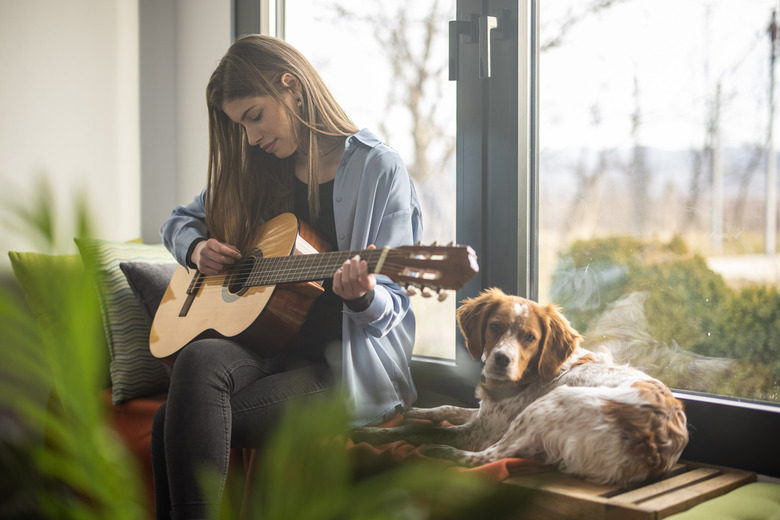Does Loud Music Hurt Dogs' Ears?
When your favorite song comes up on Spotify, you can't help but turn it up. While you love listening to loud music, you're worried that it could be making your dog stressed out or hurting his hearing.
If you learn how to spot anxious behaviors in your dog and you're mindful of how loud you're playing your music, then your dog could possibly have a much happier and more comfortable life.
Is loud music bad for dogs?
Is loud music bad for dogs?
Just like humans, dogs can experience hearing loss if they are exposed to loud noises like music for long enough. A report in the journal Topics in Companion Animal Medicine revealed that loud noises could hurt the delicate structures that are in a dog's inner and middle ear.
Dr. Kari Foss, a veterinary neurologist and professor of veterinary clinical medicine at the University of Illinois at Urbana-Champaign who worked on the study said that usually, noise-induced hearing happens as a result of, "damage to the hair cells in the cochlea that vibrate in response to sound waves." Additionally, extremely loud noise could, "damage the eardrum and the small bones within the inner ear, called the ossicles."
Though it may be hard to know exactly how loud is too loud, dog owners can look into different decibel levels. For instance, when a dog barks, it's going to be at least 60 decibels. A normal conversation is also around 60 decibels, while a lawn mower is about 90 decibels, and a rock concert is around 120 decibels. Generally, sounds above 85 decibels are harmful depending on how long you're exposed to them and if you have protection for your ears.
How to know if the music is too loud
How to know if the music is
too loud
Dogs have much more sensitive hearing than humans. They can pick up on sounds that are four times farther away than humans can hear, as well as detect frequencies that humans cannot hear. When you hear loud noises, it may not be a big deal, but when your dog does, it could sound much louder.
If loud music is playing and your dog doesn't like it, he may begin exhibiting certain anxious behaviors. For example, he might escape by running away or hiding under a bed or blanket. He may also bark, whine, or urinate where he's not supposed to. (You can consult our article What Is Your Dog's Body Language Telling You? for a more comprehensive guide on decoding dog body language!)
In order to ensure your dog is comfortable, you could listen to your music at a low volume, move to a different room, put your dog in a different place, or put on your headphones. If you're in the car, you can adjust the music so you only hear it up front – though you may still want to keep it at a low volume.
If you live in an apartment building or somewhere else where there's loud music or other loud noises, you could ask your neighbors to lower the volume, let the landlord know about the issue, and invest in an anxiety vest for your dog. You can also play with your dog with his favorite toys or give him some treats when the loud music comes on. Cuddling him and talking to him a reassuring voice should help with his anxious behaviors, too.
Signs of hearing loss in dogs
Signs of hearing loss in
dogs
If your dog has already lost some of his hearing due to loud music or other loud noises, he might not respond when you call his name. Perhaps he doesn't react to noises anymore, either, or he makes unusual vocal sounds or barks all the time. It's important to take your dog to the veterinarian right away if you believe he's lost some of his hearing. It's very dangerous for a dog to have hearing loss because he may not hear a car when it's coming down the street or notice other kinds of threats that could harm him.
In conclusion
In conclusion
Loud music could be bad for your pup, so it's best to listen to it at a low volume or wear headphones when your dog is around. If your dog is exhibiting anxious behaviors, you'll need to figure out a solution to get rid of the noise. And, if your pup seems to have some hearing loss, you'll need to take him to the vet for testing.
Always check with your veterinarian before changing your pet's diet, medication, or physical activity routines. This information is not a substitute for a vet's opinion.


